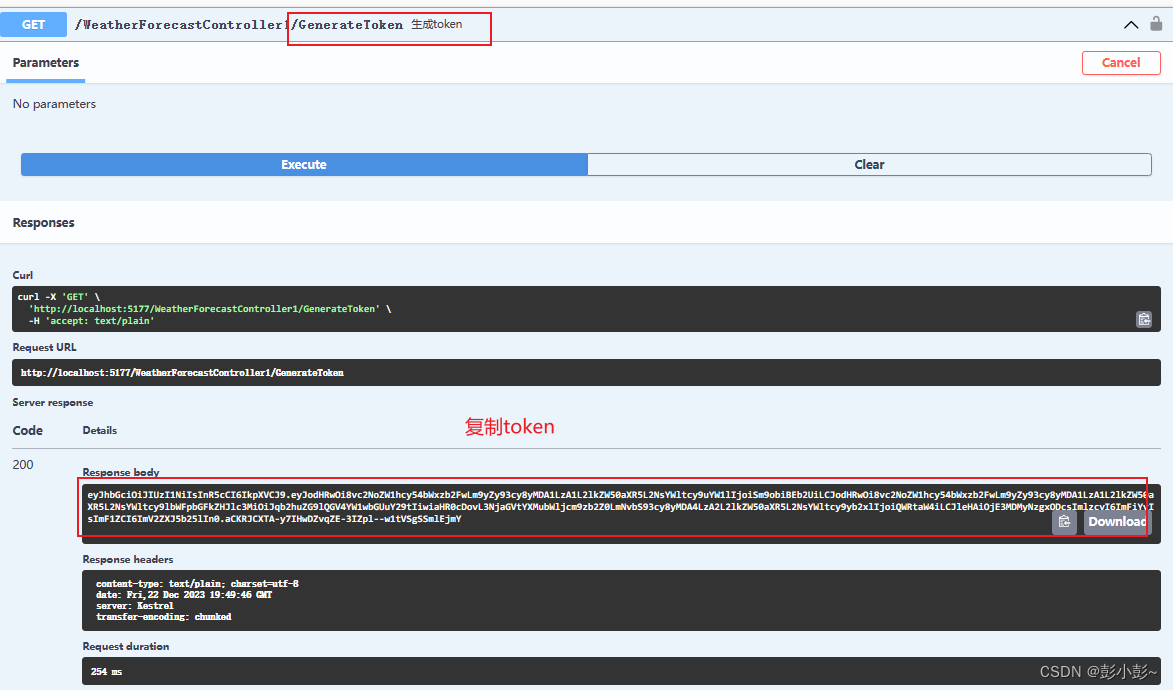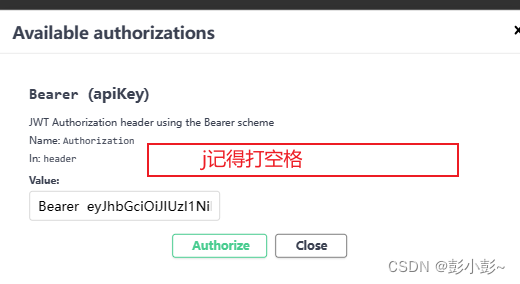.net core 生成jwt+swagger-通过 IHttpContextAccessor读取token信息
发布时间:2023年12月23日
1.安装jwt相关包
<ItemGroup>
<PackageReference Include="Microsoft.AspNetCore.Authentication.JwtBearer" Version="6.0.25" />
<PackageReference Include="Microsoft.IdentityModel.Tokens" Version="7.0.3" />
<PackageReference Include="Swashbuckle.AspNetCore" Version="6.2.3" />
<PackageReference Include="System.IdentityModel.Tokens.Jwt" Version="7.0.3" />
</ItemGroup>
2.appsetting.json配置jwt的验证信息
"JwtSetting": {
"Issuer": "pzx", //颁发者
"Audience": "everyone", //受众
"SecurityKey": "appapap122344kkappapap122344kkappapap122344kkappapap122344kkappapap122344kkappapap122344kkappapap122344kkappapap122344kk", //密钥
//token
//和我配置一样可以拿我生成的token测试 "eyJhbGciOiJIUzI1NiIsInR5cCI6IkpXVCJ9.eyJodHRwOi8vc2NoZW1hcy54bWxzb2FwLm9yZy93cy8yMDA1LzA1L2lkZW50aXR5L2NsYWltcy9uYW1lIjoiSm9obiBEb2UiLCJodHRwOi8vc2NoZW1hcy54bWxzb2FwLm9yZy93cy8yMDA1LzA1L2lkZW50aXR5L2NsYWltcy9lbWFpbGFkZHJlc3MiOiJqb2huZG9lQGV4YW1wbGUuY29tIiwiaHR0cDovL3NjaGVtYXMubWljcm9zb2Z0LmNvbS93cy8yMDA4LzA2L2lkZW50aXR5L2NsYWltcy9yb2xlIjoiQWRtaW4iLCJleHAiOjE3MDMyNzMwODYsImlzcyI6InB6eCIsImF1ZCI6ImV2ZXJ5b25lIn0.ePY0ZkDQGF1GJWKqiCQjUn2y7aSNG1WesfBH5xPy1Fg"
}
3.校验token的合法性(在progam文件)
#region JWT 认证
builder.Services
.AddAuthentication(JwtBearerDefaults.AuthenticationScheme)
//.AddCustomAuth(o => { })
.AddJwtBearer(options =>
{
options.TokenValidationParameters = new TokenValidationParameters
{
ValidIssuer = builder.Configuration["JwtSetting:Issuer"],
ValidAudience = builder.Configuration["JwtSetting:Audience"],
IssuerSigningKey = new SymmetricSecurityKey(Encoding.UTF8.GetBytes(builder.Configuration["JwtSetting:SecurityKey"]))
// 默认允许 300s 的时间偏移量,设置为0
//ClockSkew = TimeSpan.Zero,
ValidateLifetime = true
};
});
#endregion JWT 认证
4.在swaggerUI中配置Bearer认证(在progam文件)
builder.Services.AddSwaggerGen(c =>
{
c.SwaggerDoc("v1", new OpenApiInfo { Title = "Your API", Version = "v1" });
// 添加Bearer认证支持
c.AddSecurityDefinition("Bearer", new OpenApiSecurityScheme
{
Description = "JWT Authorization header using the Bearer scheme",
Name = "Authorization",
In = ParameterLocation.Header,
Type = SecuritySchemeType.ApiKey,
Scheme = "Bearer"
});
c.AddSecurityRequirement(new OpenApiSecurityRequirement
{
{
new OpenApiSecurityScheme
{
Reference = new OpenApiReference
{
Type = ReferenceType.SecurityScheme,
Id = "Bearer"
}
},
new List<string>()
}
});
});
5.配置SwaggerUI(在progam文件)
app.UseSwaggerUI(c =>
{
c.SwaggerEndpoint("/swagger/v1/swagger.json", "Your API V1");
//加载api中文注释,true是加载控制器上的注释(须在项目属性-生成勾选生成api文档)
c.IncludeXmlComments(AppContext.BaseDirectory + Assembly.GetExecutingAssembly().GetName().Name + ".xml", true);
// 在Swagger UI中添加Bearer认证输入框
c.DisplayRequestDuration();
//启动过滤
c.EnableFilter();
c.EnableDeepLinking();
c.EnableValidator();
c.SupportedSubmitMethods(SubmitMethod.Get, SubmitMethod.Post, SubmitMethod.Put, SubmitMethod.Patch, SubmitMethod.Delete);
});
6.添加授权服务 (注意两者的先后顺序)
app.UseAuthentication();
app.UseAuthorization();
7.生成token信息
using Microsoft.AspNetCore.Authorization;
using Microsoft.AspNetCore.Mvc;
using Microsoft.Extensions.Configuration;
using Microsoft.IdentityModel.Tokens;
using System.IdentityModel.Tokens.Jwt;
using System.Security.Claims;
using System.Text;
namespace webapi.Controllers
{
[ApiController]
[Route("[controller]/[action]")]
public class WeatherForecastController1 : ControllerBase
{
private readonly ILogger<WeatherForecastController1> _logger;
private readonly IHttpContextAccessor _httpContextAccessor;
public IConfiguration _configuration { get; }
public WeatherForecastController1(ILogger<WeatherForecastController1> logger, IConfiguration configuration, IHttpContextAccessor httpContextAccessor)
{
_logger = logger;
_configuration = configuration;
_httpContextAccessor = httpContextAccessor;
}
[HttpGet]
public int[] Get()
{
return new int[] { 1, 2, 3 };
}
/// <summary>
/// 生成token
/// </summary>
/// <returns></returns>
[HttpGet]
public string GenerateToken()
{
string issuer = _configuration["JwtSetting:Issuer"];
string audience = _configuration["JwtSetting:Audience"];
var securityKey = new SymmetricSecurityKey(Encoding.UTF8.GetBytes(_configuration["JwtSetting:SecurityKey"]));
//使用对称加密算法加密
var credentials = new SigningCredentials(securityKey, SecurityAlgorithms.HmacSha256);
//负载信息
var claims = new[]
{
new Claim(ClaimTypes.Name, "John Doe"),
new Claim(ClaimTypes.Email, "johndoe@example.com"),
new Claim(ClaimTypes.Role, "Admin"),
// 可以添加其他常用的claims,如ClaimTypes.Sid,ClaimTypes.GivenName等
};
var token = new JwtSecurityToken(
issuer: issuer,
audience: audience,
claims: claims,
expires: DateTime.Now.AddHours(1),
signingCredentials: credentials
);
var tokenHandler = new JwtSecurityTokenHandler();
return tokenHandler.WriteToken(token);
}
/// <summary>
///获取token信息
/// </summary>
/// <returns></returns>
[Authorize]
[HttpGet]
public IActionResult GetUserInfo()
{
var user = _httpContextAccessor.HttpContext.User;
// 获取用户的名称声明
var userName = user.Identity.Name;
// 获取用户的所有声明
var userClaims = user.Claims;
// 遍历所有声明并输出
foreach (var claim in userClaims)
{
Console.WriteLine($"Claim Type: {claim.Type}, Claim Value: {claim.Value}");
}
return Ok("User information retrieved successfully");
}
}
}
8.注入 builder.Services.AddHttpContextAccessor();
builder.Services.AddHttpContextAccessor();
9.演示
执行如图方法生成token

10.复制token 填入Authorize输入框格式 Bearer+空格+token

11.访问方法,获取token里存的claim信息

为啥httpcontext能读取到token的信息呢?
在一个.NET Core应用程序中,通常使用身份验证和授权来验证用户并控制他们对资源的访问。当用户进行身份验证后,他们通常会收到一个包含有关其身份的信息的令牌(token),例如访问令牌(access token)或身份令牌(identity token)。
这些令牌一般包含在HTTP请求的标头(header)中,例如Authorization标头。在.NET Core应用程序中,HttpContext中的User属性会包含与已验证用户相关的信息,而这些信息通常也包括从令牌中提取的声明(claims)。
end…
文章来源:https://blog.csdn.net/qq_41942413/article/details/135163942
本文来自互联网用户投稿,该文观点仅代表作者本人,不代表本站立场。本站仅提供信息存储空间服务,不拥有所有权,不承担相关法律责任。 如若内容造成侵权/违法违规/事实不符,请联系我的编程经验分享网邮箱:chenni525@qq.com进行投诉反馈,一经查实,立即删除!
本文来自互联网用户投稿,该文观点仅代表作者本人,不代表本站立场。本站仅提供信息存储空间服务,不拥有所有权,不承担相关法律责任。 如若内容造成侵权/违法违规/事实不符,请联系我的编程经验分享网邮箱:chenni525@qq.com进行投诉反馈,一经查实,立即删除!
最新文章
- Python教程
- 深入理解 MySQL 中的 HAVING 关键字和聚合函数
- Qt之QChar编码(1)
- MyBatis入门基础篇
- 用Python脚本实现FFmpeg批量转换
- 手把手带你死磕ORBSLAM3源代码(五十二) FrameDrawer.cc Update
- a*x*x+b*x+c=0方程的解
- Spring中Bean的生命周期
- AD教程 (二十)PCB快捷键的设置和推荐
- Pandas实战100例 | 案例 20: 日期时间运算
- Python写冒泡
- js(JavaScript)数据结构之链表(Linked List)
- 命令行导出导入数据库
- linux文件目录权限
- 基于java的出租公司管理系统设计与实现